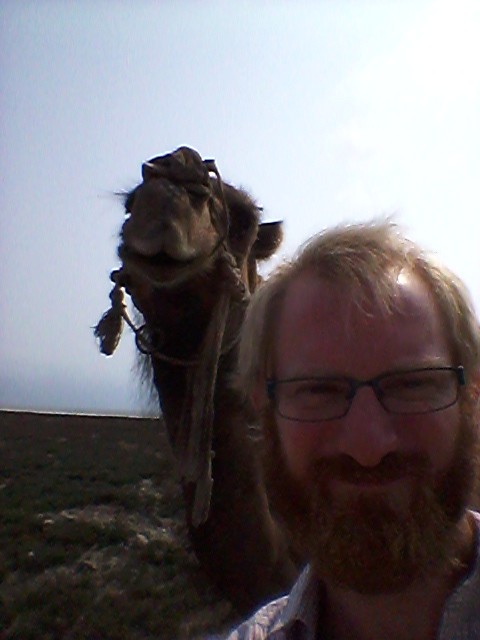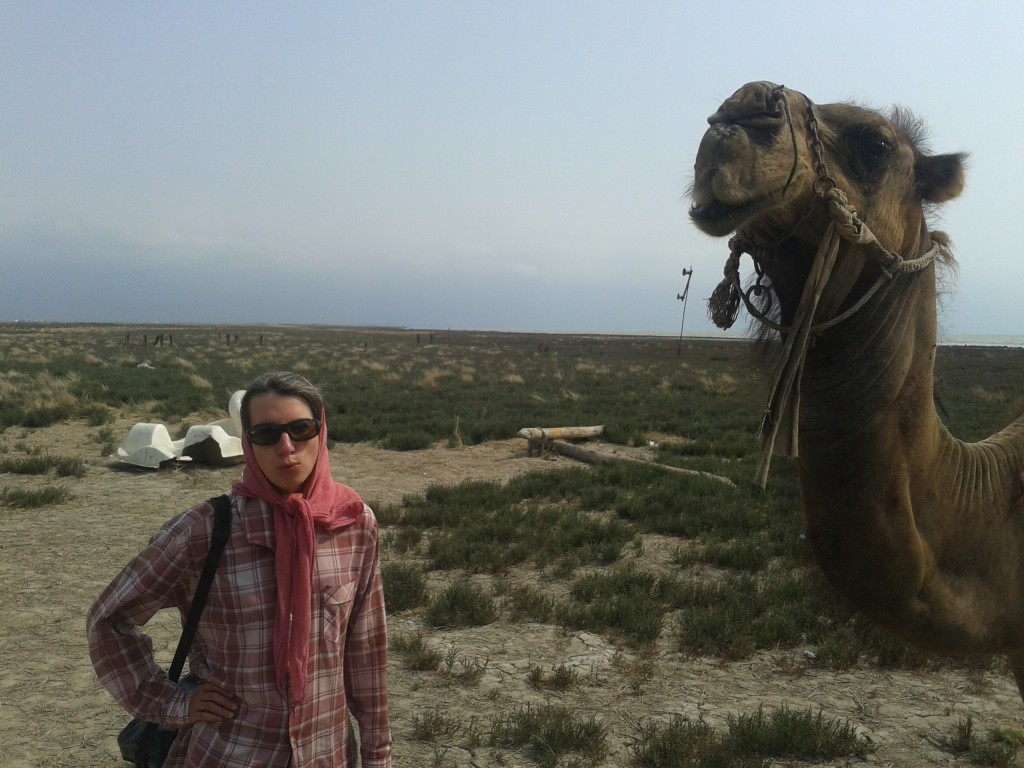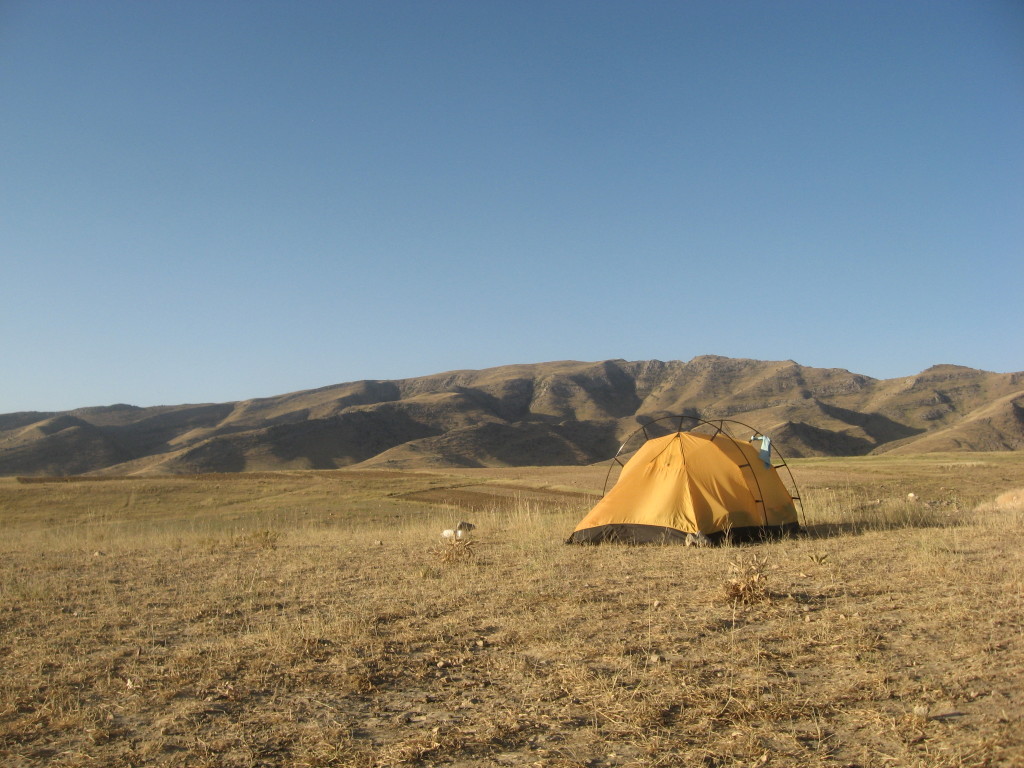After we return from our trip to Isfahan, Yazd and Shiraz we spend another day in Tehran and get our visa for Tadjikistan and Turkmenistan. We also try to extend our visa for Iran, because our Turkmen visa is valid from July 15th, but our Iran visa already expires on July 5th. We had tried to extend the visa in Shiraz already, but got rejected.
In Tehran we spend several hours to find the „Office for Foreign Aliens“. We give up at around 2pm, because everybody tells us it is closed by now.
We stay another night at Marieh and Manuchehr, but already get up at 4am the next morning.
We want to escape the traffic and the heat. Marieh gets up together with us. We say good bye to Marieh and Manuchehr. We had a great time with them. Thanks a lot!
At 4:45am I leave a message in a bottle and we start to cycle. The city is quiet and the air is still cool. It takes us 3 hours from west to east through Tehran. Eventually we leave the smog zone and breathe in almost clean air.
Soon only one road leads towards the mountains. We get tired around noon because we didn’t have much sleep. We take a break under a bridge, where we sleep for two hours.
It is a strange road with some little villages and some unbelievably ugly tall apartment buildings.
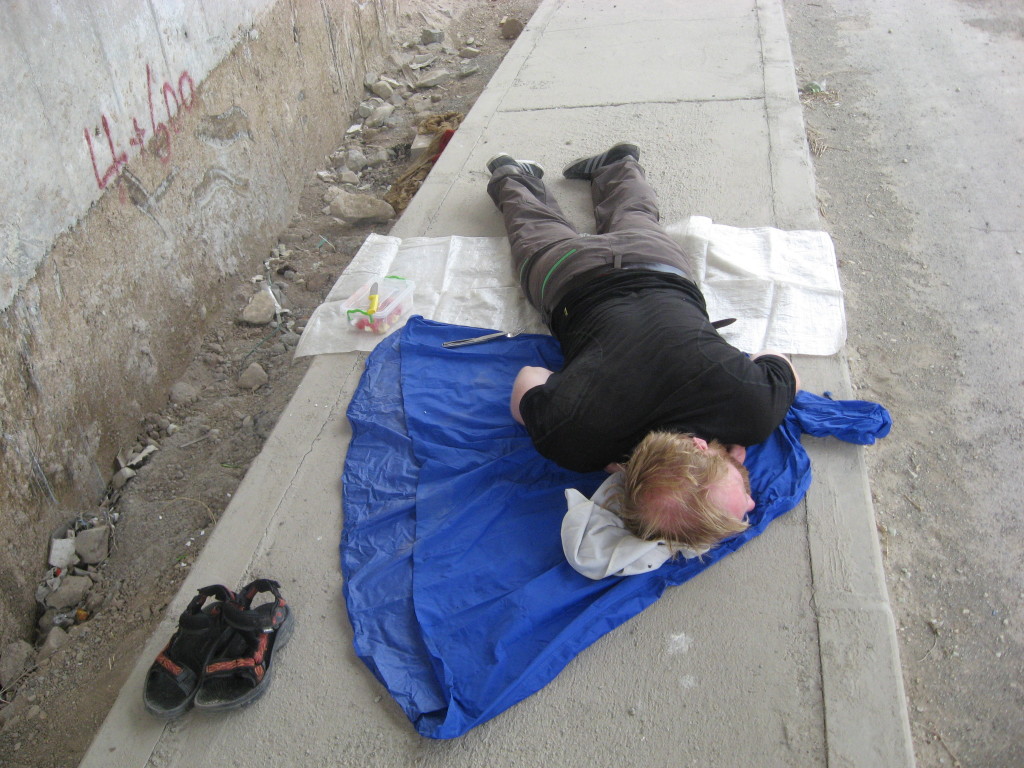
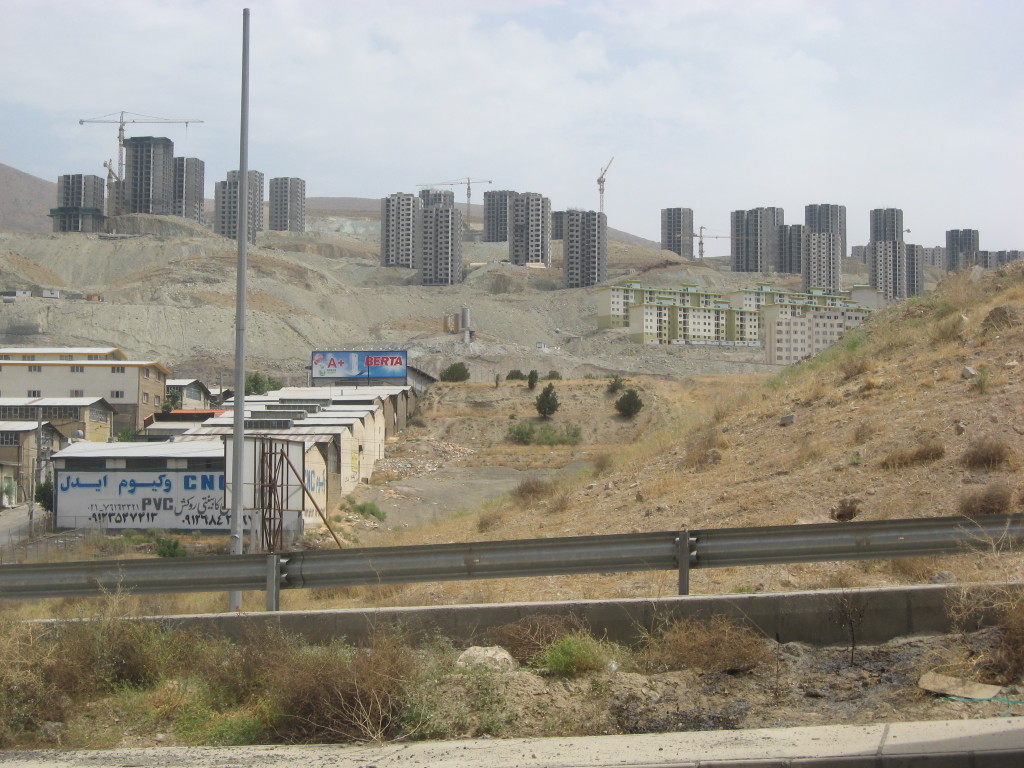
We reach a village around 600m below the top of the pass, pitch the tent and prepare dinner.
The next day on our way to the top a cyclist approaches us from behind. His name is Ritzo, he is from the Netherlands. Ritzo is a great guy, that’s for sure, but probably the most remarkable thing about him is that he is traveling with only one pair of shoes: Wooden clogs.
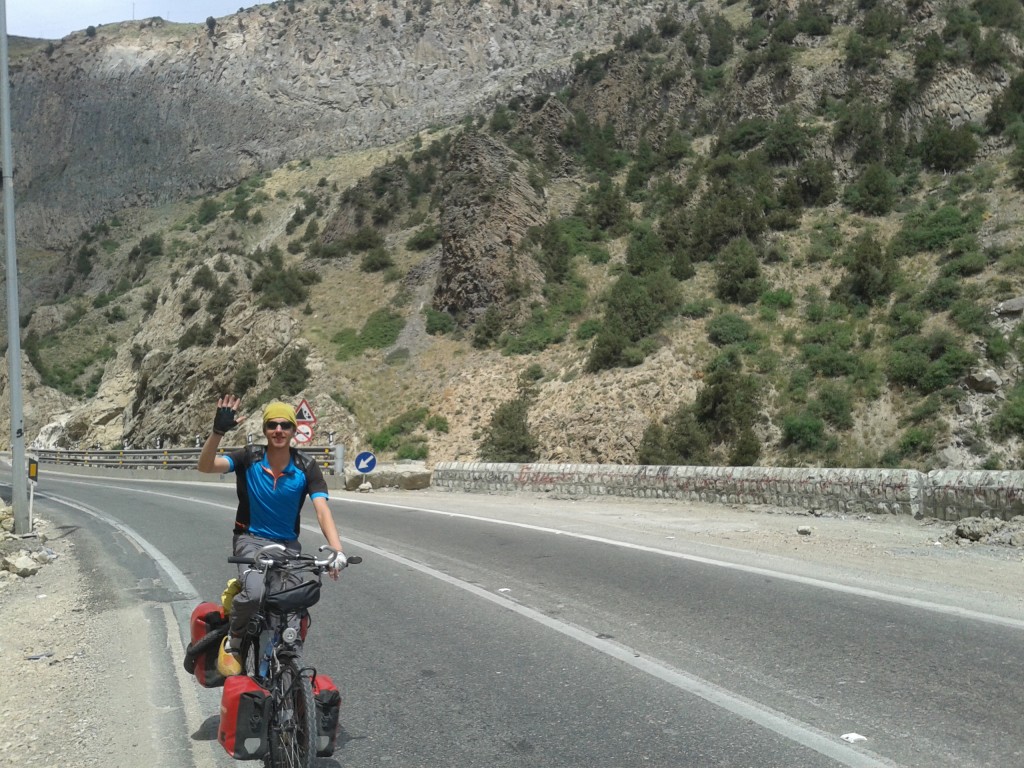
Together with Ritzo we cross the pass and cycle downhill for hours towards Amol. I like this road through the mountains north of Tehran. The mountains are high, but nothing is growing on them. It is just too dry here. And once in a while you can spot him. The king, the giant: Mount Damavand (6510m).
image missing
The closer we get to Amol the more the weather changes and also the mountains. While Tehran was hot and dry with almost no plants, Amol is hot and humid with lot of forest and huge rice fields.
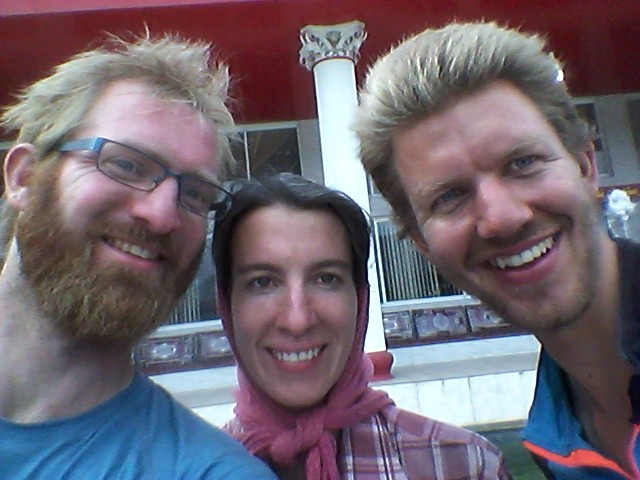
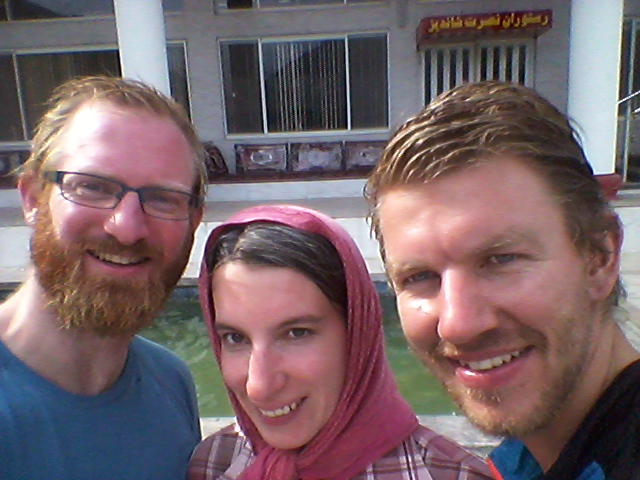
We leave the road to find a place to pitch the tent, when a big guy in a car stops to ask where we are from. He also speaks German and tells us to come to his lodge, which is still under construction. We call this guy The Godfather, because he has a pretty mafia-like attitude. He is accompanied by a former boxer with big scars in his face and malformed ears. And another guy who reminded me on Silent Bob (Dogma).
We tell the Godfather that we still need to extend our visa and if he knows anything about the Office for Foreign Aliens in Sari.
godfather: I have friend who works with police.
Me: Oh, he is a police officer.
Godfather (smiles): No just works with police.
Then he gives us his phone number and the address of the office. If they reject us again, he says, we should call him.
I also want a watermelon, so I ask if there is a shop. He and his two bodyguards accompany me to the shop, where a nervously smiling guy is hastily looking for the biggest and best watermelon in his shop and he insists on giving it to me for free. The Godfather seems pleased and so am I.
So Cora, Ritzo and I eat watermelon in the garden of The Godfather. He says there will be a pool as soon as the villa is completed. We should come back in a month, he says.
Unfortunately the villa is not even partly finished, so we decide to pitch the tent in the garden, which is a bad idea. We feel like some tuna in a can. The humidity is awful, but the Iranians like it. Lots of people go north to the Caspian Sea to escape the dry heat of Tehran. For us it was one of the worst nights so far.
The next day we continue to Mahmudabad and reach the Caspian Sea. Ok, lets just swim to cool down. Uhm, no! Of course Cora can only swim fully clothed, but it isn’t possible to swim at all. You are only allowed to go in knee deep for unknown reasons. Better than nothing, but we expected it to be different, especially because Mahmudabad is a tourist beach. Also there are no cafes or bars. Maybe because it is Ramadan. Anyway it is an unusual image.
Soon we continue towards Babolsar, where we plan to take our first warm shower.
Warmshowers.org
Of course we don’t need a warm shower in this heat, but that’s the name of a website for cyclists. We first heard about it in Batumi when we talked to other travelers.
Warmshowers is similar to Couchsurfing.org. It is a community website, but only for cyclists. If you are a cyclist, you can stay at other cyclists home for free. When you return to your country and have a home again, you in turn host other cyclists for free.
So a few kilometers to Babolsar I call Reza who is registered as a warmshowrs host. Even though we arrive the same day he accepts our request. When we arrive in Babolsar we say good bye to Ritzo who has traveled with us for two days. He has to hurry a bit and needs to make 100km everyday until he enters Turkmenistan. Have a good time, Ritzo! It was great to meet you.
We call Reza again and he soon comes with his bicycle and leads us to his place. Reza has just registered on warmshowers recently, because he wants to cycle to Turkey next week. Also his little daughter is out of house for the first time. She stays at her grandmother overnight, otherwise he couldn’t host us, Reza explains.
Reza and his wife show us the city and we go shopping for dinner on the bazaar. We have a good time and hopefully could give good advice to Reza. We wish you luck on your first cycle trip. Maybe one day you make it to Germany. We are waiting for you.
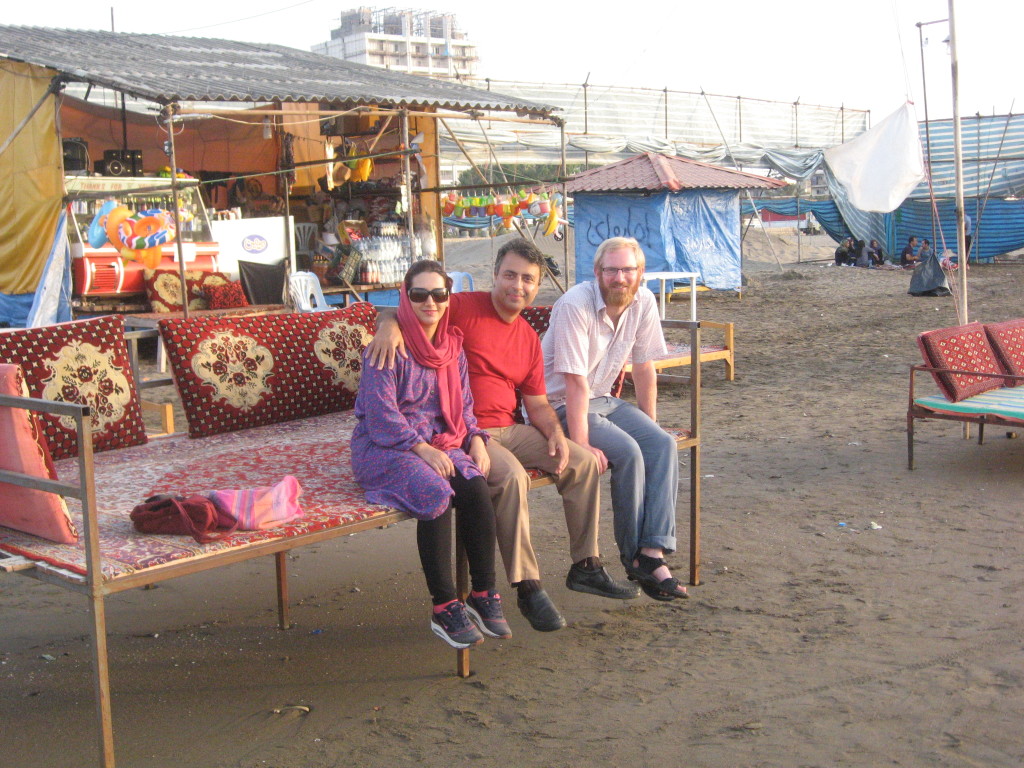

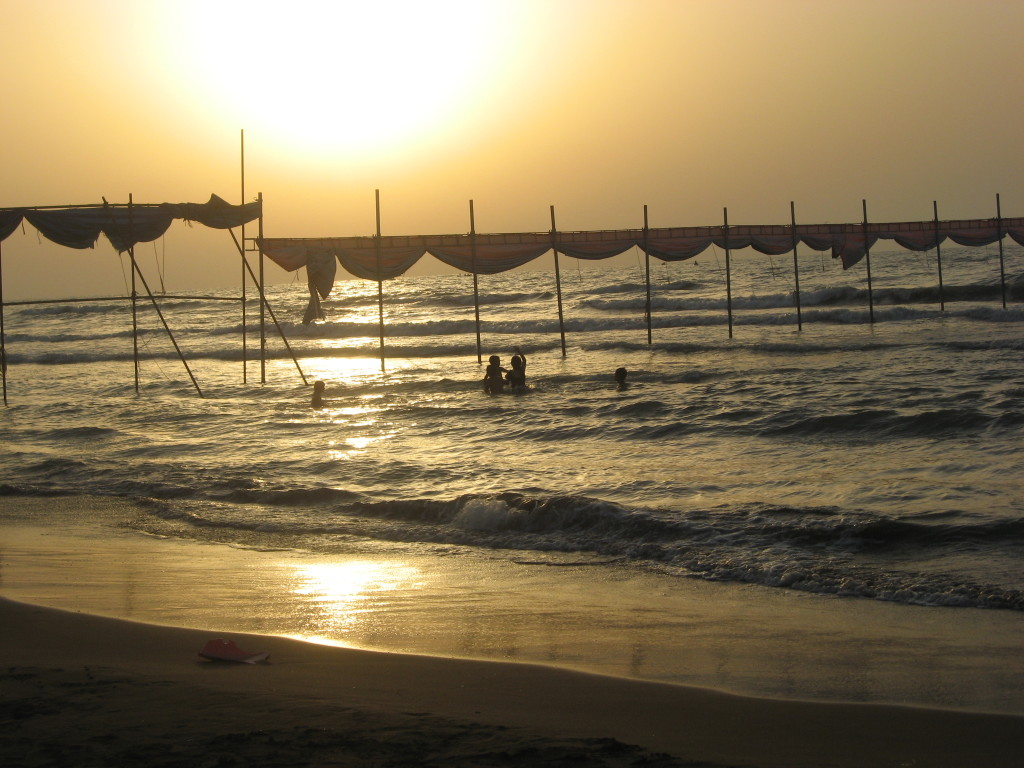
After Babolsar we head towards Sari, where we want to extend our visa. We liked the warmshower experience with Reza and his wife and so we decide to try it again in Sari. We don’t get any answer from two hosts, but can finally call a third one. He speaks only a little bit German and we explain where we are. He lives 12km outside of Sari, but insists to pick us up. In fact he shows up almost an hour later, even though we told him, that we don’t want to sleep 12km outside the city, because we need to be at the Office for Foreign Aliens in Sari in the early morning already.
But now he came all the way with the taxi and so we don’t want to disappoint him. So he leads us to his son’s family, who live in the city center. We have tea and dinner at their place.
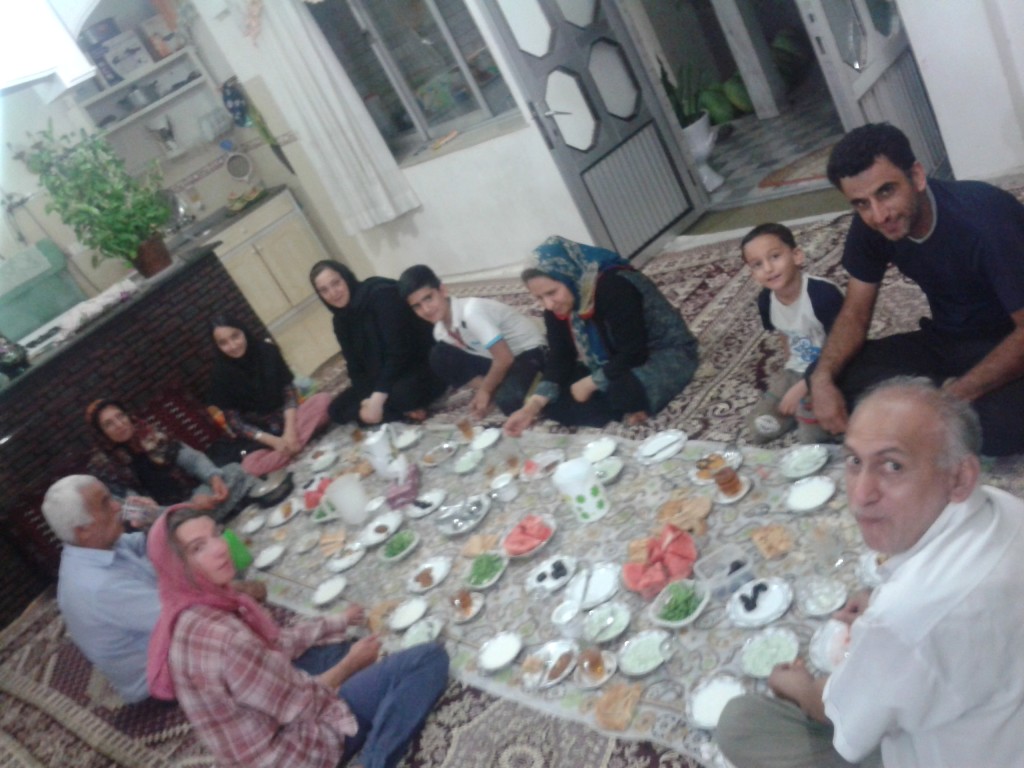
And since we cannot stay the night at their place, they even manage to get a pickup truck. So in the middle of the night we drive 12km to this guys home in a small village. He is so happy and surprised that all this happens to him. Because he is a rather old guy, already retired for several years. A friend of him just put his contact details on warmshowers a year ago, but so far nobody called him. He once worked together with German engineers, that’s why he speaks some German still.
And we get an idea of how isolated Iran is. Not only is it really difficult to get a visa for any other country than Turkey, Georgia, Armenia and Thailand, but also due to the embargo only a few tourists come to Iran. A German tourist in Iran is like a needle in a haystack. So this guy just can’t believe it.
When we leave early the next day he hugs us. It seems like he is about to cry. It is heart warming. I guess he didn’t expect that to ever happen. That two Germans actually stay a night at his home in a little village outside of Sari. Thank you! We hope you have more guests soon.
The next day we try to extend our visa in Sari and get rejected again. They say we should try in Gorgan.
The Visa conspiracy
I told you we tried to extend the visa in Shiraz already and got rejected. The problem was, that our visa expires on July 5th, but the Iranian officials only want to extend it three days before it expires. So in Shiraz there were still to many days left. Now in Sari we still had 7 days left, but tried to explain our situation: We are cyclists and the Offices of Foreign Aliens are only in the capitals of the Iranian provinces.
Now it is not always possible to cycle to the next capital within three days. Also according to the most famous website about travelling Iran and Central Asia, there are little chances to extend the visa in Sari. For Gorgan (the capital of Golestan province) there is no information at all. If we don’t get the visa extended in Gorgan we have to quit traveling by bicycle, take the train to Mashhad, get the visa extended and then hang around close to the Turkmen border for 10 days. That’s bad. So Gorgan is our last chance.
Already the next day we arrive in Gorgan and stay there for a night in a way too expensive hotel. The standards are poor. The whole night the noise of the lightnings coming from the socket disturbs the silence of the otherwise quiet room.
The next day, however, the hotel pays off. The hotel manager drives us to the Office for Foreign Aliens and manages everything for us. We pay at a bank, fill in a form and get the stamps. Visa extended. Done!
We decide to cycle back to the Caspian Sea, because so far we were only concerned about the visa extension. We end up in Bandar e Torkman and stay there for two days. The first evening we get invited for picnic dinner after sunset (it is still Ramadan).
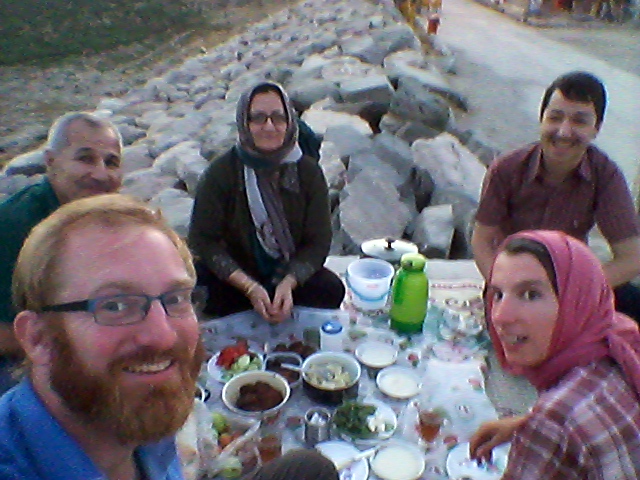
Unfortunately it is not possible to swim in the Sea here. There are only some fishermen and some camels and a lot of people. But at least the women are all wearing colorful dresses, which looks nice at the beach promenade. Up here in Bandar e Torkman, a lot of Turkmen live and Turkmen women dress very differently.
Apart from that the two days are pretty ugly. There is no shower anywhere near and it is very humid. Also we cannot pitch the tent and just sleep on one of the divans.
The beach is nice, but since you cannot swim – it is all muddy and very shallow – the Caspian Sea is as useful as a fork to eat some soup. Also there is nothing to do. Ramadan as always makes things worse. We can’t even go to a nice restaurant or drink some cool fruit juice. So we spend the days having some arguments and then leave ready for another warmshower – the creator of the website must have been traveling a lot in iceland.
We continue towards the Golestan forest or as they call it here: The jungle. It is a long trip that day. We cycle 125km. It is hot and humid. But half way we get a text message. Actually Bagher, a warmshowers guy in Ramian who rejected us earlier just asked some friends if they also want to join the warmshowers community. They did and invited us to be their first guest.
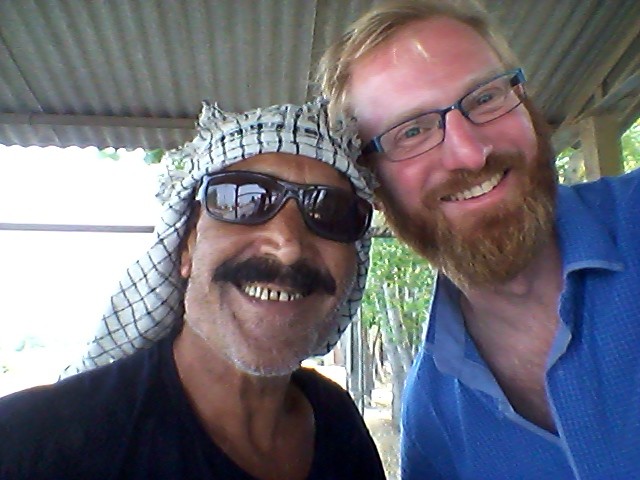
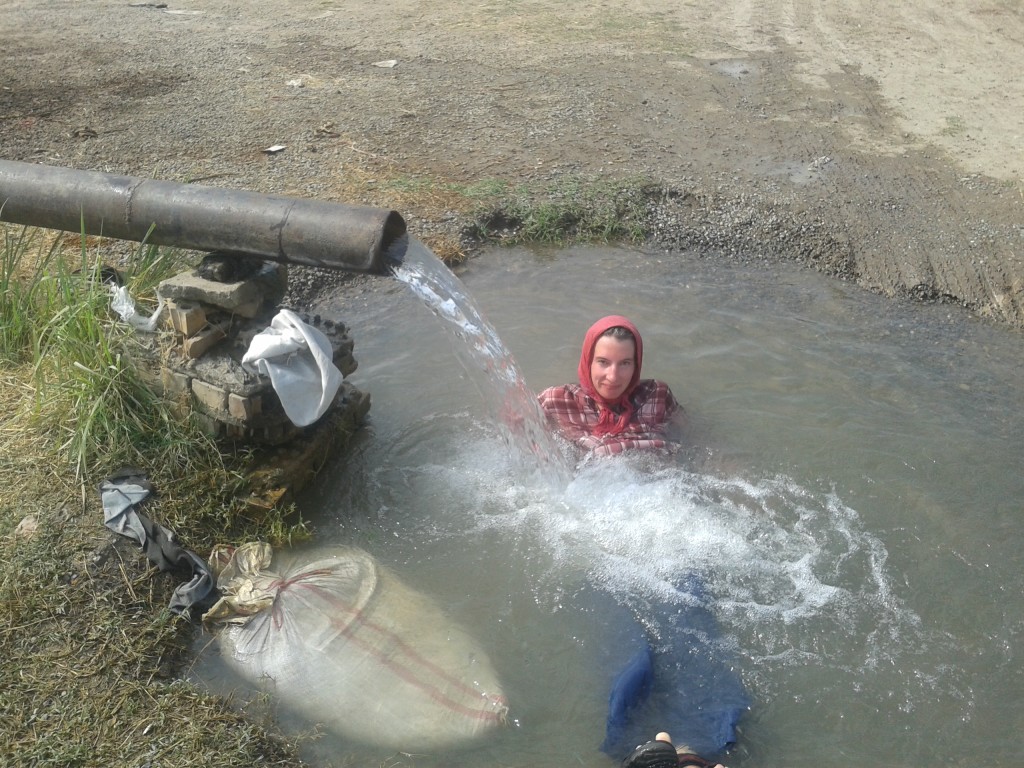
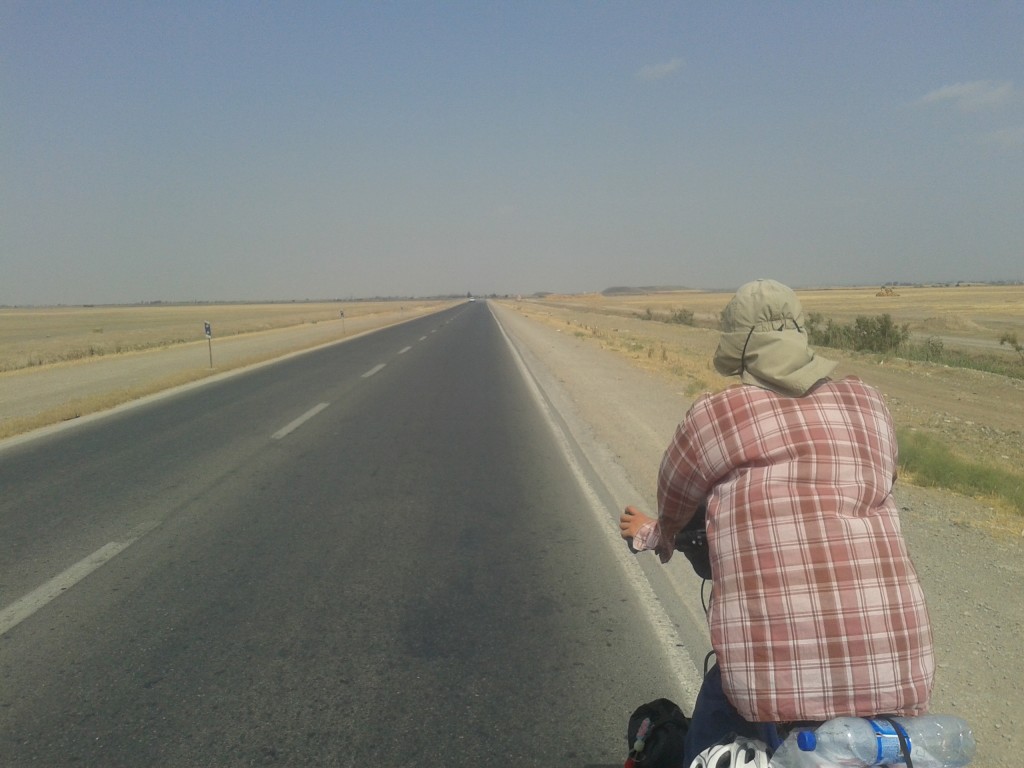
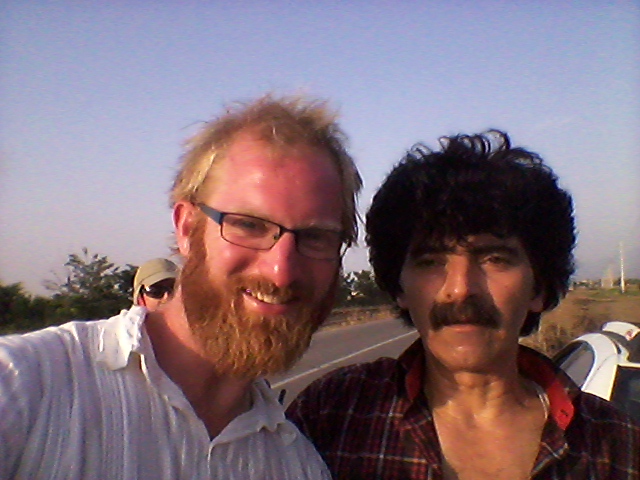
We arrive in Ramian at night. A guy on a motorcycle approaches us, while we are still cycling. It is Amir our host.
Amir and his wife Sanaz are two funny people. They are easy going, calm, friendly. In the evening Bagher shows up. He is the other guy from warmshowers who rejected us earlier. The next day we visit plum trees and go swimming in a lake. And it starts to rain for the first time since Armenia.
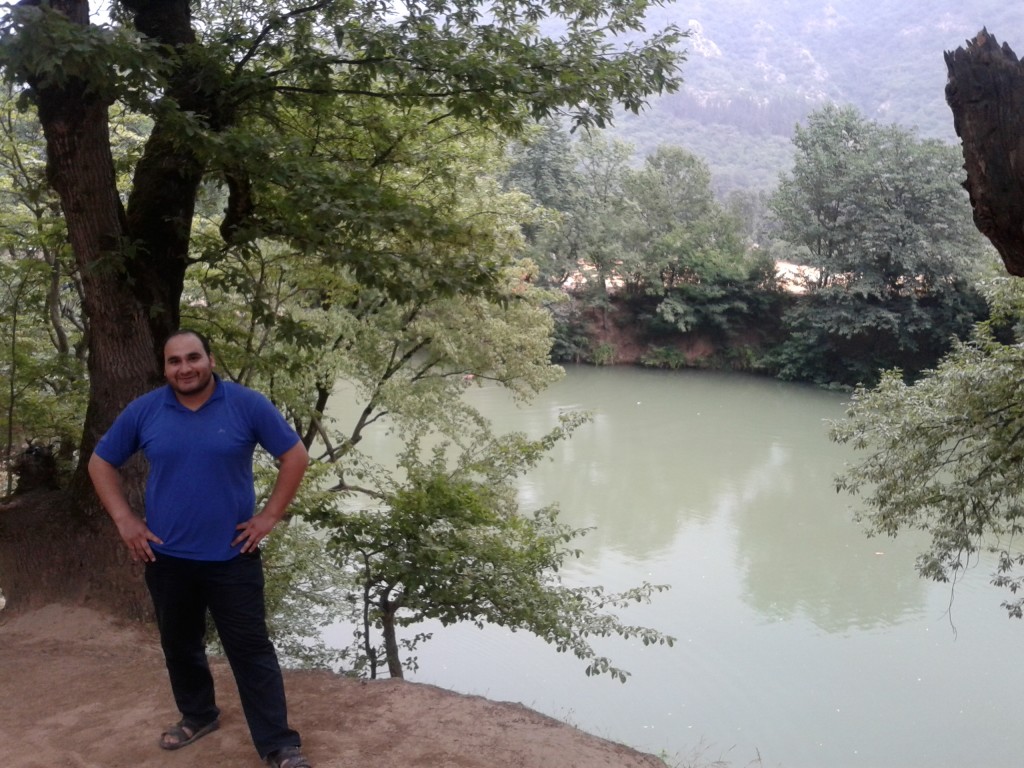
It’s just a pleasant time. In the evening we cycle through the city with Bagher while Amir and Sanaz are following with the motorcycle. We spend some time in the park, playing volleyball and table football. After a while we return home. Amir asks if I want to come with him for a ride with his motorcycle. Why not, I wanted to do this anyway already in Tehran.
We move to a spot a bit outside of Ramian on a little hill, where you have a beautiful view. The street lights of Gonbad are flickering in the distance. I think Amir loves his town. He knows everybody here and he runs his own business. Actually he is a software developer like me. But also sells some computer hardware and computer games in his little shop next to a shashlik bar.
But standing on the hill above Ramian he dreams of another life. He also wants to travel the world. He looks at his belly and says: „Maybe with motorcycle“. Then he smiles.
We loved to stay at your place! I hope one day we hear the sound of your motorcycle in front of our home. Be our guests!
After two nights at Amir and Sanaz we continue to Gonbad, which is just 30km away. Bagher has a day off and accompanies us, which is crazy, because he is cycling like us in this humid, hot air – 30km and back – but he is not allowed to drink, because it is Ramadan and he takes it seriously.
We visit the Gonbad tower, say good bye to Bagher and then have a rest in a little park right next to the tower.
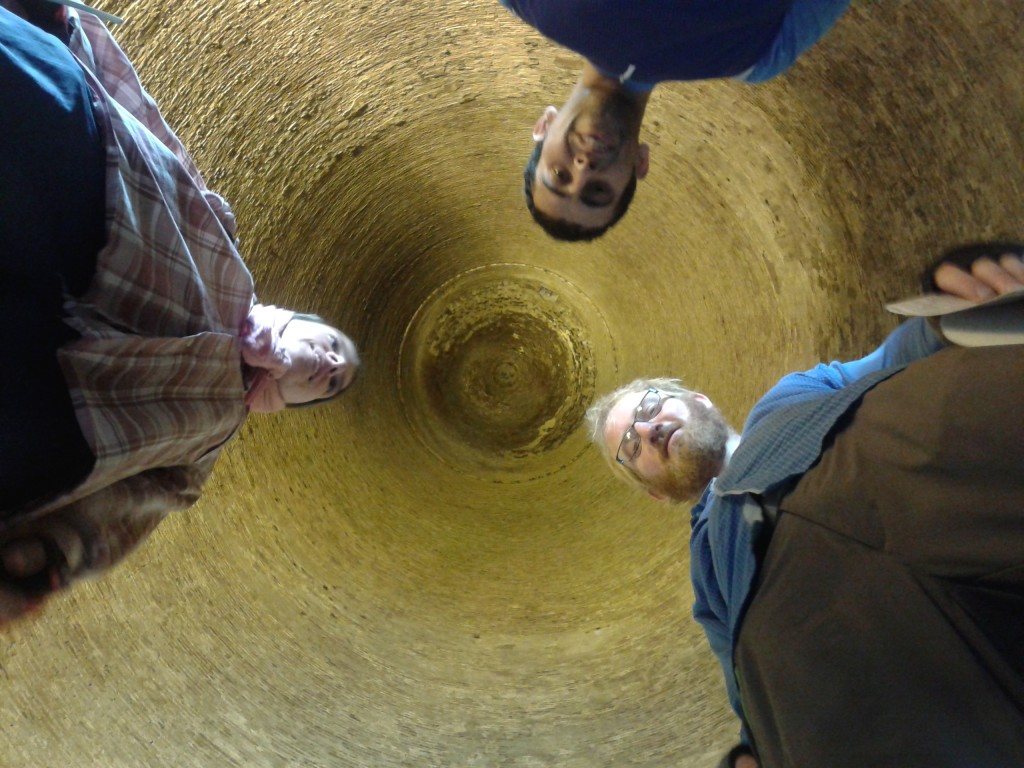
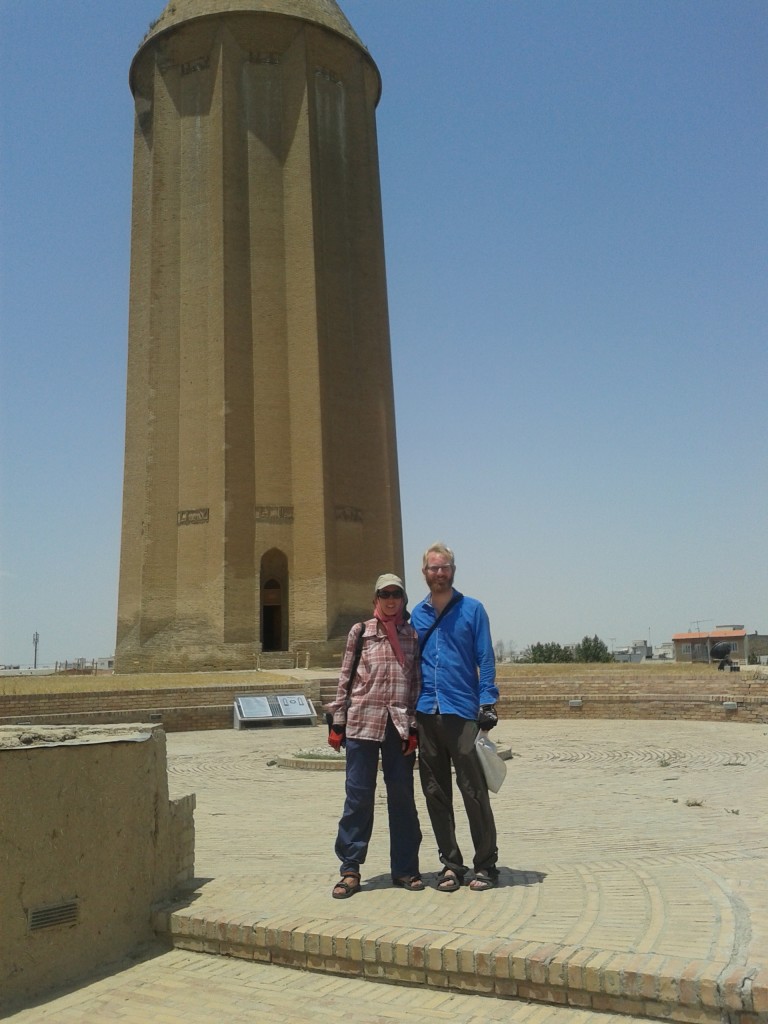
After a while some Iranian cyclists pass by and stop. They sit down next to us, but cannot speak any English. They call someone. That guy speaks some English and tells us, that an English teacher will come to the park. 15 minutes later Massud shows up. He is the English teacher. Also Saeed shows up seconds later. He is a registered warmshowers member.
That was quick. Did you notice something? We didn’t even call anybody. We didn’t even want to stay in Gonbad. We just had a break in a park. Now we sit on Saeeds couch. He offers tea and something to eat, although he is not allowed to eat himself. His mother comes home from work and prepares dinner. Sun sets, they pray, then we eat. Afterwards we cycle through the city with Massud, Saeed and some friends of them. Saeed stays awake the whole night so he can eat until the morning prayer. He then sleeps most of the day. That’s one way to handle Ramadan if you have to study like him.
The next day Massud accompanies us for more than 30km with his bicycle. He is a very open minded guy and we learn a lot about Iranian culture from him, because in the end he is an English teacher, so we can actually communicate very well.
Meanwhile Massud has called Taher, who works as a Ranger in Golestan National Park (The Jungle). He will wait for us at the Red Crescent station right at the border to the National Park. We will spend the night there.
You need to know, that you can escape the Golestan Jungle or avoid it. But you cannot avoid or escape the Iranian hospitality. So after Massud leaves, we cycle until we see the Red Crescent. Everybody is already waiting for us. Dinner is ready. Taher shows up. We give our second TV interview. This time for a documentary about the Red Crescent. So we have to answer some questions about ourselves and then about how the staff at the Red Crescent station treats us and – my favorite question:
Interviewer: Why did you decide to stay at the Red Crescent?
Me (thinking): Uhm, well, I don`t know. I just found it on booking.com and it was recommended on TripAdvisor as well, so yeah…
Me (saying): Uhm, some guy in Gonbad just told us we can stay here….and of course the Red Crescent is a trustworthy organisation, so….
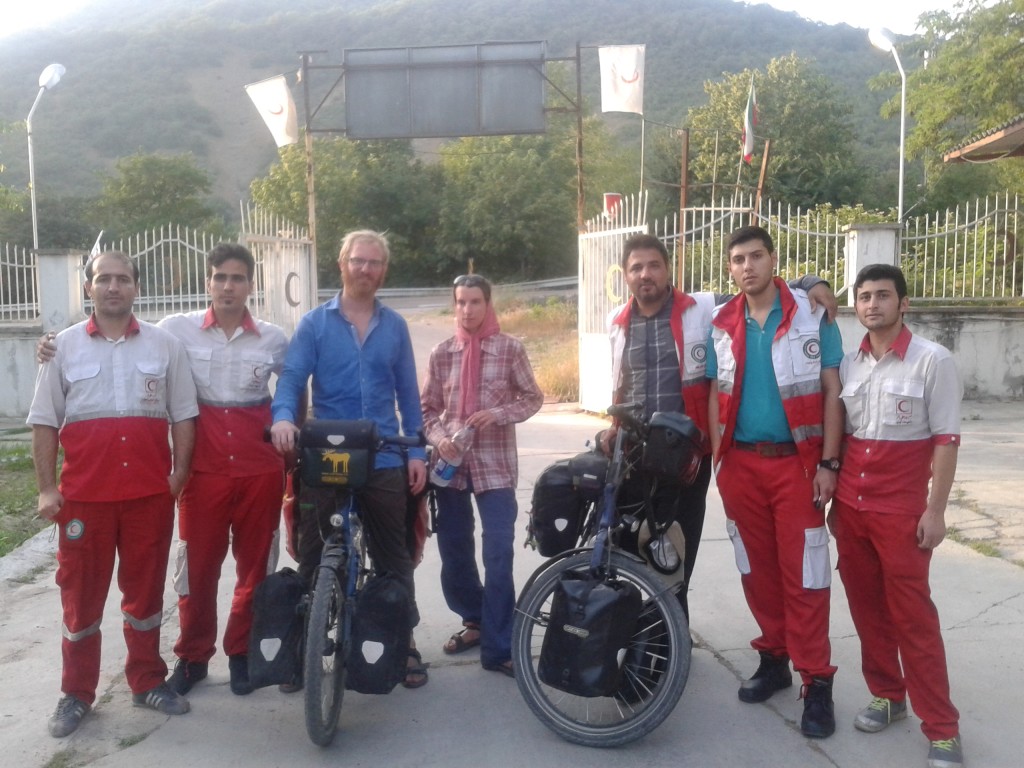
The next day Golestan Taher shows us some waterfalls in the jungle and then we continue to cycle towards Bojnurd.
Mr. And Mrs. Gang
When I was writing the post about the different letters in different countries – Learn how to read and write – Cora called me „Erklärbär“. That’s German for someone who tries to teach others without being asked to do so. The last sentence is another example of that behavior.
You can skip this paragraph if you want. If you read on, however, I will teach you something I noticed and I found pretty interesting.
In Russian „dog“ is „sabacca“. Remember that for a second. In Farsi „strawberry“ is „toot-ferengi“ (no idea how it is actually written). And „tomato“ is „gotche-ferengi“.
Now in Gorgan we met a guy and I asked him, what strawberries and tomatoes have in common. Why do they both end in „ferengi“? He replied, that ferengi means something like „stranger“ or „from a stranger“. It actually means, that strawberries and tomatoes are not endemic. They have been brought to Persia by foreigners.
„So that’s all?“ you might ask. No. But if you like science fiction movies, maybe you noticed something:
In Star Wars, the best friend of Han Solo is Chubaka, who pretty much looks like a mixture of a dog and a human. Now Chubaka sounds almost like Sabacca. And you remember sabacca is Russian for dog.
What about Ferengi? Ever heard of Star Trek? There is Mr. Spok, who is a Vulcan. There is Lieutenant Worf who is a Klingon. But once in a while you will also see an alien species called Ferengi. Now they don’t look like tomatoes or strawberries, but you could say they definitely look like strangers. And if you take an even closer look, you will notice, that the words „foreigner“ and „ferengi“ are obviously of the same origin.Coincidence? I think not!
Now what has all of this to do with Mr. And Mrs. Gang? Not much. But this info box is about language and words and their origins.
You need to know that Cora and me got married one day before we entered Iran. Not really! But we decided to tell everybody we are married, because in Iran you actually are not allowed to be together with a woman, if she is not your wife. As Europeans and non-muslims it actually doesn’t matter, but also our hosts can get in trouble, if they host an unmarried couple. So in order to keep things simple, we just decided to tell everybody we are married. If you read this and are one of our hosts, we truly apologize for lying to you. In our culture being married is not as important is it is in Iran.Of course our names are also unknown in Iran. A lot of people actually had difficulties with the name Cora. Even though their holy book is called almost the same. They always pronounce it „Cola“. And my name? Some know Wolfgang Amadeus Mozart, but of course not everybody. So some just call me „Wolf“. And actually I thought they just use this short for Wolfgang. But when they started to ask if Cora’s full name is Cora Gang I started to understand, that languages can be quite tricky. Now I also understood, why some asked me if I was Chinese, after they had asked for my name. Apparently they assume that Gang is my last name and therefore I must be Chinese. At least I cannot think of any other reasonable explanation of why someone could possibly think I am Chinese.
From then on I always explained what my name actually means. It is an old Germanic name: The man who walks (or fights) like a wolf.The Iranians liked it. Sounds a bit like „Chief Running Buffalo“ – or „Dances with wolves“.
I hope you learned something.
The Erklärbär.
The European Union
Yesterday, shortly before the Red Crescent station we met a couple. Pablo and Ilze. Pablo is from Spain and Ilze from Latvia. They also cycle the world, but without any time limit.
We cycled together for a while. While Cora and me stayed at the Red Crescent, Pablo and Ilze continued and wanted to pitch the tent somewhere in Golestan National Park. However, we exchanged phone numbers. Today we get a message with the coordinates of their position. So we meet again and decide to continue together. We talk a lot about our experiences in Iran. Especially about the Monkey-In-The-Cage feeling. That’s when all the attention from the Iranian people is too much and you just can’t have a minute of rest, because everybody wants to talk to you or invite you or take a picture. You lose control over the situation and can only escape by moving on.
We actually spend almost a week together with Ilze and Pablo, since we are going the same direction. One day we separate around noon, because Cora and I want to move on and Pablo and Ilze want to continue only in the evening, when it is cooler. The two of us then cycle to Bojnurd, where Shiva and Milad – our warmshower hosts – wait for us. They tell us, that two other cyclists will also stay at their place, but will arrive later. Guess who it is? Pablo and Ilze.
We have a good time, pitch the tents together, share some stories, relax together in parks.
In Quchan we separate, because Cora and I are going to Turkmenistan, while Pablo and Ilze need to catch their Turkmen visa in Mashhad.
These few days were great. Especially, because people got really confused wherever we showed up. Two from Germany, one from Spain and one from Latvia. The European Union.
(waiting for image from Pablo)
After we have separated, Cora and I continue towards Bajgiran – the last village before the Turkmen border.
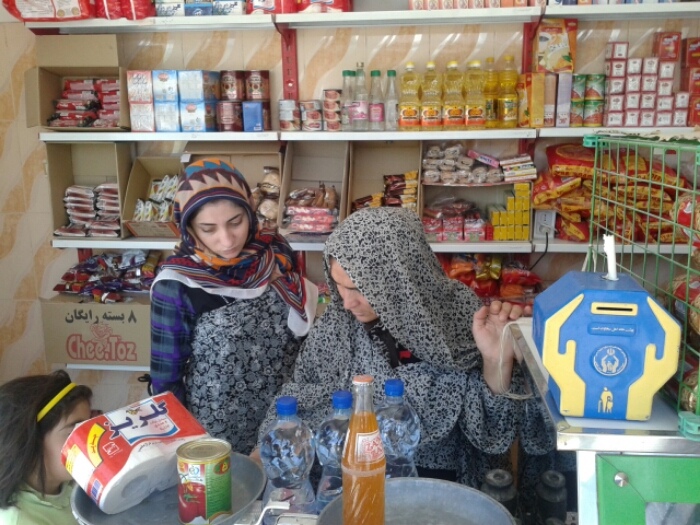
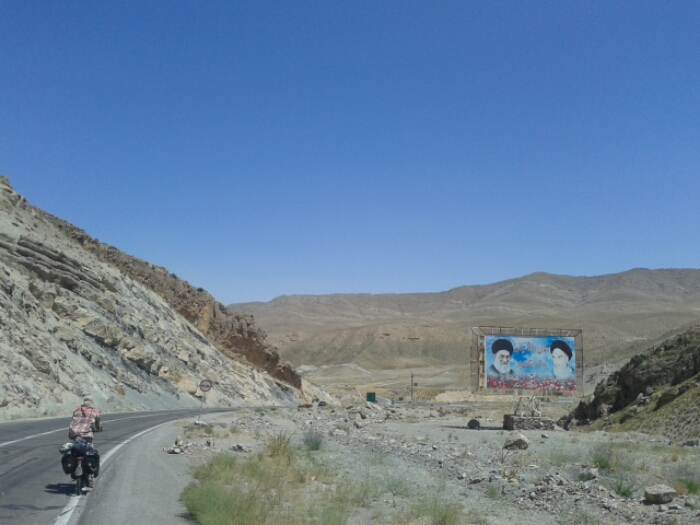
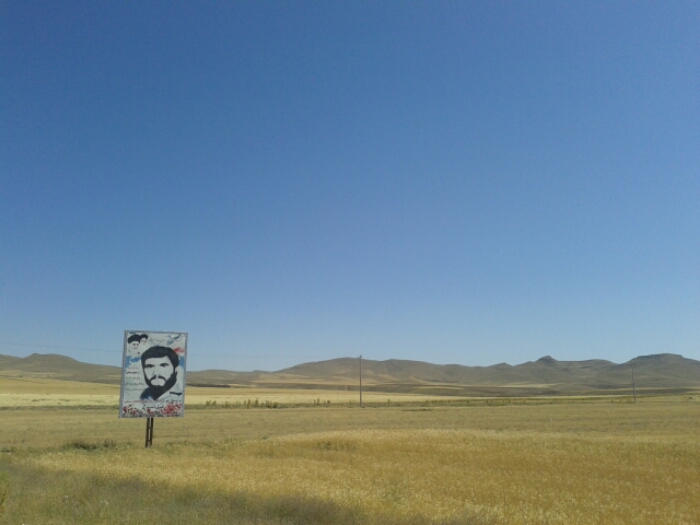
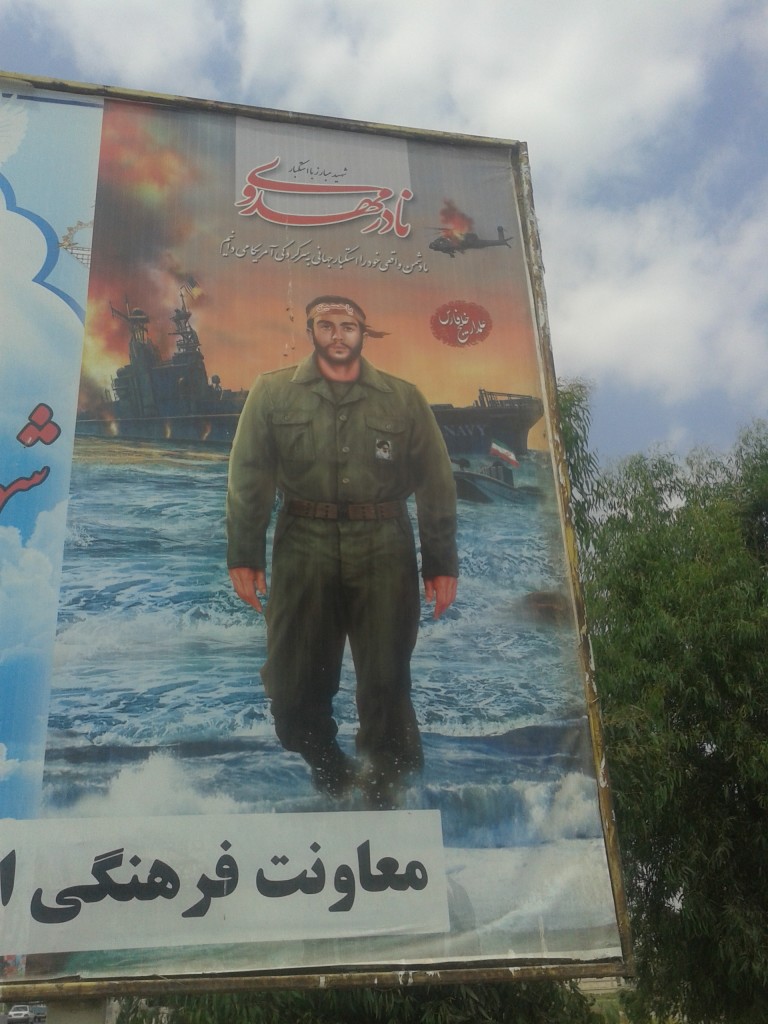
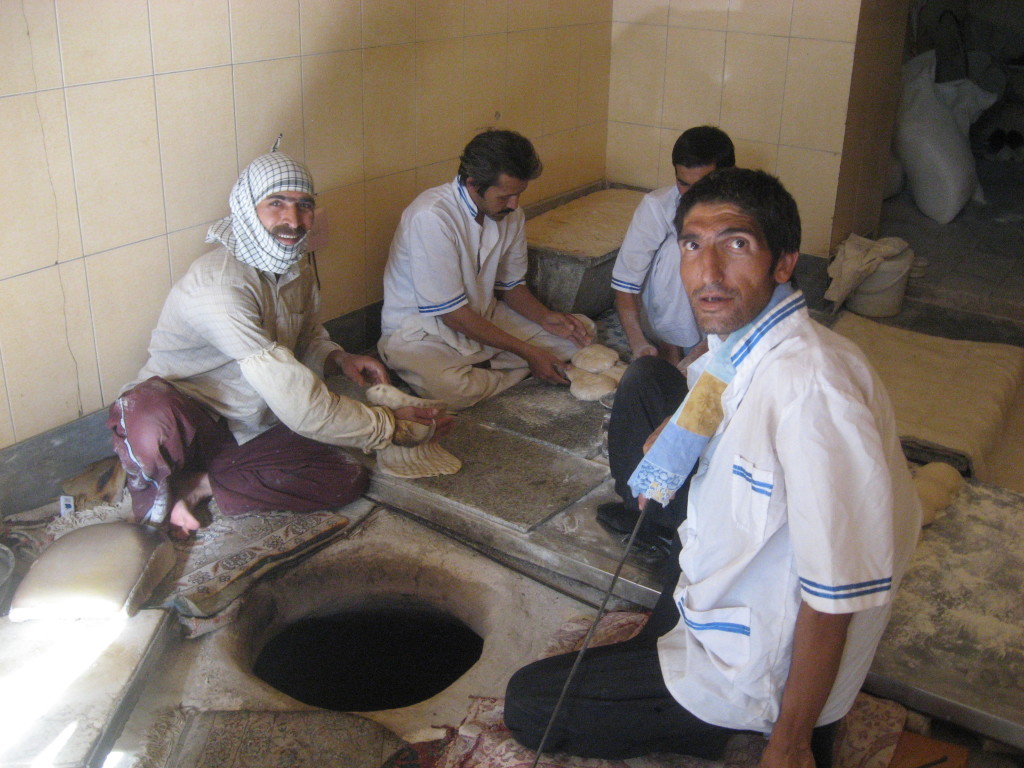
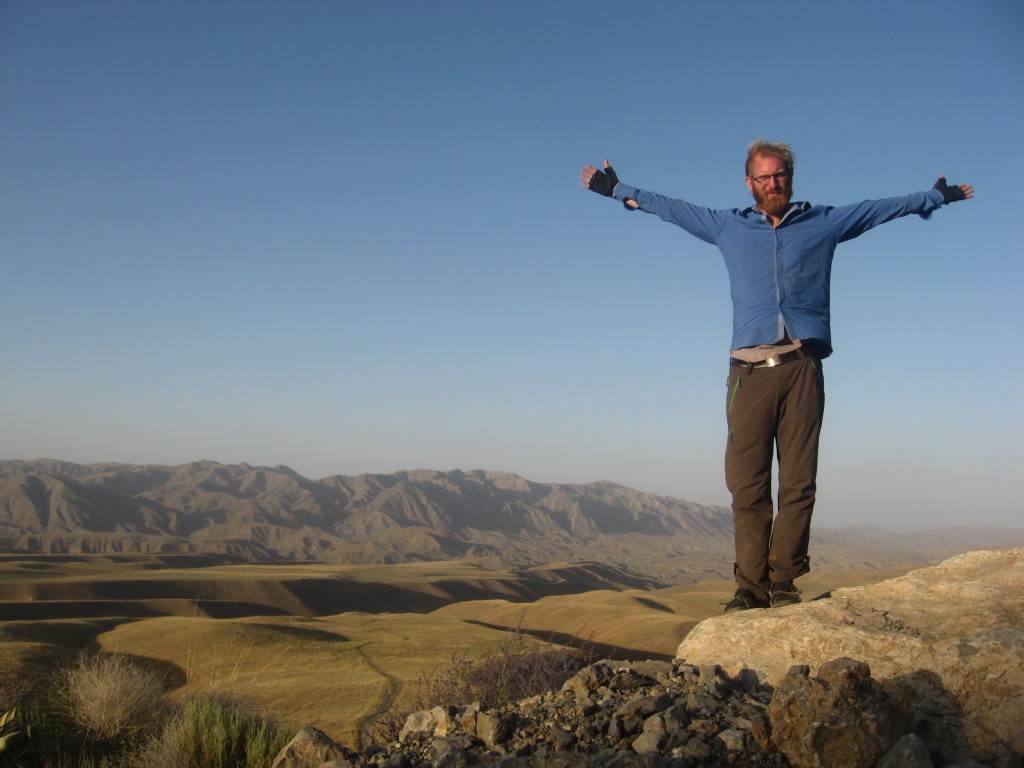
Isms
Actually I wanted to write a whole post about political and cultural aspects of Iran. But I won’t. We’ve learned a lot during the last 40 days in Iran. We got a lot in touch with locals, stayed at their homes and talked to them a lot.
If I think about the times before we started to travel and what image I had of Iran, I feel like this was another world I was living in. However, I don’t want to try to tell you how it „really“ is, because I actually don’t know.
What I know is, that the western media portrays Iran from a political point of view. Sometimes also from a cultural or religious point of view. And since I am neither a political jounalist, nor a theologist, I actually have the same info about these aspect as any body else who only consumes western media and books.
So I don’t want to say they are wrong. Like everybody else I can only chose, whether I trust their information or not.
But I didn’t visit Iran as a member of the German goverment, nor as a human rights activist. I am only a cyclist, a traveler.
So I want to tell you about what I experienced as a traveler cycling together with my „wife“ Cora during Ramadan:
First, the Iranians are probably the most hospitable people we will meet during our journey. I of course don’t know that yet, but other travelers who have seen more countries than us, told the same. It is just unbelievable. And Iran is safe. Actually I didn’t even feel that safe in Germany. There were times in Shiraz, when we didn’t have a hotel in the evening, but I just didn’t mind. I was just thinking, if we don’t find one, we ask some people if we can sleep in the yard. It will be ok. And not just ok. They will care for you and will make you feel at home.
You can also pitch the tent in any park, no matter if you are in Tehran, Yazd or Isfahan. Probably someone will show up anyway and invite you home for dinner and to stay there the night.
There are mosques everywhere. Usually there are also showers and toilets at the mosques, which you can use – sometimes for a little fee. If you cannot handle the heat any more, you enter the next mosque. Mosques usually have the best air conditioning.
The hijab and other clothing rules for women are just annoying. Also the idea of getting 70 lashes if you drink alcohol in public or have sex with a woman who is not your wife is frightening. For me punishment only makes sense if you do something wrong to someone else, but not if it only concerns yourself or all other involved parties agree. But people stick to these rules mostly not because they fear punishment, but because it is a part of their religious culture. What the family and friends think about you, when you don’t stick to the rules is what they are afraid of. And that’s something which is probably the case in every culture.
Another interesting thing we noticed during the time in Iran is that they openly show a lot more emotions than western people. It is like the difference between a football player interview in the 80s and now:
In an 80s interview the football players were honest, unprepared and sometimes funny
Today they are neutral, prepared and often boring.
They don’t know political correctness the same way we know it. The Monkey-in-the-Cage feeling was often annoying for us, when we were surrounded by some hysterical people laughing and screaming and pointing at us. But I tried to see it as human nature. It is curiosity. Western people are just educated not to do it. The problem is that the downside of being educated like that and being politically correct is, that people also lose a lot of spontaneousness. And I have to admit, the same way I was annoyed by the Monkey-in-the-Cage feeling, I was pleased by their warm and open way of approaching us in most other cases. You could see they were shy, nervous, insecure to talk to a stranger. But they still did talk to us. And staying at their homes was easy in most cases and made us feel absolutely normal, like a member of the family.
So yeah, I guess we often talk about extremes of Iran and its Islamic culture. And more often than not about negative aspects. That’s ok, but we miss something else by taking this standpoint. And we not only miss it. I’m afraid to say: We lack it, too.
You come on over right through my front door
Strapped with all your baggage, what you bringin‘ that for?
Don’t want no disrespect ‚cuz we all know the score
But you need to put time in at the common sense storeYes, yes, y’all, you’re brain washed all in your head
Let’s make one thing crystal clear
We don’t want no ism hereHow you say you hate me and you’re not ashamed
It’s just insecurity that’s causing you pain
Well, if you can’t get past that, we are not the same
Then realize that ism is a part of the blame
